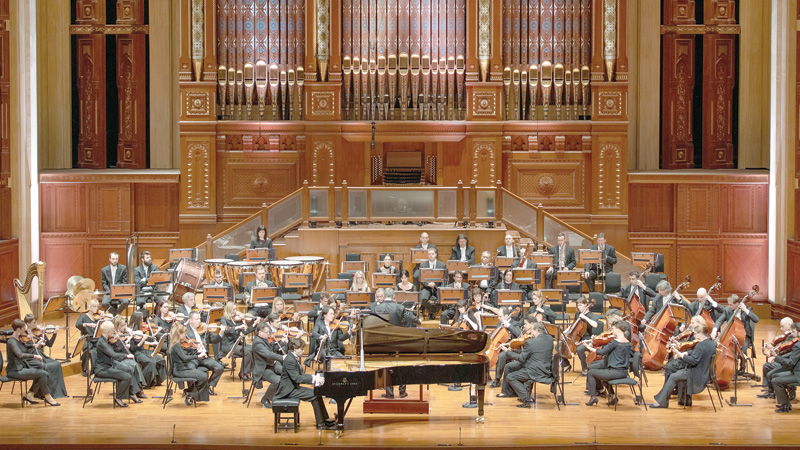

Georgina Benison -
Photos: Khalid al Busaidi -

The nearly New Year’s Eve gala concert at the Royal Opera House Muscat this year was a veritable feast of orchestral and operatic gems of exaggerated proportion. The first half highlighted the superb playing of the Zagreb Philharmonic Orchestra under the Italian conductor, Marcello Mottadelli on his second visit this year.
It opened with a breath-taking interpretation of Rimsky-Korsakov’s much loved and familiar, ‘Festival at Baghdad’, the bright Fourth Movement from his ‘Scheherazade’ suite. It was appropriately chosen for this performance in the Gulf and a New Year’s Gala.
It was arresting for its crisp opening tempo, precise articulation, dynamic contrast from the whole ensemble and the silences that resounded between phrases. This was really a tale of two concertos: Concert Master, Orest Shourgot, shone brilliantly in the solo fiddle double-stop melody at the beginning, and the poignant duet with harpist, Veronika Ćiković at the end, earning a well-deserved ovation.
Twenty-five year old Moscow-born prodigy, Arseny Tarasevich-Nikolaev (his grandmother was the composer Tatiana Nikolaeva) rose to the considerable technical challenge in Franz Liszt’s ‘First Piano Concerto’. He made a powerful solo entrance almost immediately in the Allegro Maestoso and sustained the tension, playing almost continuously, throughout the concerto.
The Quasi Adagio was tender and sensitive, while the highly chromatic romantic harmonies and huge Lisztian parallel chords were brilliantly executed by the young soloist, finishing in a dazzling virtuosic flourish. Unfortunately no encore was prepared, despite the audience applause.
Operatic megastar, the forty-year-old Italian tenor, Vittorio Grigòlo, took the stage by storm as he entered with Verdi’s 1851, ‘La Donna è Mobile’ from “Rigoletto”. This canzone famous for tenors as a showcase was well chosen by this born-performer, walking up and down front of stage, captivating the audience with his huge, powerful voice. Immediately his breath control and dynamic range became apparent. In Donizetti’s beloved aria, ‘Una Furtiva Lagrima’, his timbre was warm and richly resonant with an almost baritone quality and not nasal at all. It was introduced by a haunting Cor Anglais solo from Žarko Antonić and echoed by the softest control in his range.
The stunningly beautiful young Kazakh soprano, Maria Mudryak, dressed in startling red, pouted and flirted her way through an unfamiliar aria from “Don Pasquale” and established her supreme abilities with some high coloratura acrobatics.
In an extended extract from ‘L’Elisir d’Amore’, the couple had a chance to exploit the blend of their voices in the famous Duet, ‘Caro Elisir!’ as Vittorio toyed with a plastic water bottle for all the world like a precious love-potion, cajoling Maria in a convincing recitative. His unwavering, glorious presentation was unmistakeable and the concept of ‘drama queen’ would do justice!
Mascagni’s ‘Intermezzo’ from “Guglielmo Ratcliff” gave the orchestra another opportunity, opening with a beautiful oboe obligato from Zoltan Hornyanszky.
Though unknown, it is was a desired lush, romantic score which built up in a dramatic crescendo, showing off the orchestra to its best warm, sonorous timbres.
The programme began to sound like last week’s ‘Opera on Ice’ with Puccini favourites. “La Bohème”’s chestnut, ‘Your tiny hand is frozen’ was full of broad gesture from Grigòlo, milking the acoustics in the hall for all its worth. The twenty-four year old Mudryak’s impossibly clear and sensuous performance in, ‘O Soave Fanciulla’ was slightly overpowered by the tenor during the duet phrases, but she regained her ground and won hearts in her perfect and delightful role as Musetta in the famous waltz, ‘Quando M’en Vo’soletta’ from the same opera.
Grigòlo’s restrained and dramatic interpretation of the famous ‘E Lucean Le Stelle’, from “Tosca” almost sotto voce, was echoed by clarinet obligato from Mario Fabijanić and segued into the short ominous melodrama of Leoncavallo’s romantic, ‘Pagliacci’ Intermezzo. The Finale — but by no means the end — was the iconic tenor aria, ‘Nessun Dorma’ from “Turandot”, beautifully executed with long, sustained notes from side-stage, immodestly gesturing the audience for more applause to ensure the first encore, from Verdi’s ‘La Traviata’ — the unforgettable duet ‘Brindisi’ with Maria Mudryak. Here his rapport with Maestro Mottadelli was apparent, and the conductor’s skill in following the singers’ changing tempi was needed more than ever.
Whipping up crowd enthusiasm, the second encore was the 1898 beloved Neapolitan aria, ‘O Solé Mio’, showing no performer fatigue in his continued impressive breath control. There is no doubt that Vittorio Grigòlo embodies showmanship and charismatic stage presence, concluding his set with a reprise of ‘O Solè Mio’. It was becoming unclear however, if the audience, now moving forward in the aisles and clapping along like pop-fans, or this energetic Italian tenor, just did not want this unforgettable evening to ever end.
Oman Observer is now on the WhatsApp channel. Click here



